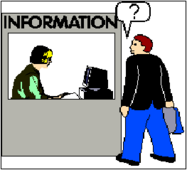TAMIC is a pilot project funded by the European Community to investigate the feasibility of NL access to heterogeneous information systems. The main project is planned to start in 1996.
Distributed information is accessed by using reusable NL systems. Information management (in public administrations, banks, industry) is changing throughout Europe, creating the urgent need to allow citizens (or customers) to access information concerning them in a clear and transparent way. Based on the emergence of networks, modern information systems allow the widespread decentralization of information: at each desk and counter, all information could be accessed. The TAMIC approach involves the use of general, reusable NL systems that will be able to combine the results of querying different kinds of information subsystems in such a way that the user receives a coherent answer. The systems will be adapted, and extended, to different languages, domains, tasks and user profiles.
User groups are involved from the very beginning. The TAMIC partners cooperate with various user groups from the very beginning. Presently, different kinds of public administration in several countries are involved, but the user group will be extended to include banks and industrial companies. DFKI cooperates with the Environmental Administration of the Saarbrücken Regional Council (Umweltamt des Stadtverbands) who has available to it environmental data that form a basis for many political decisions with direct impact on everybody's life. Computerized maps of environmental quality standards of the Saarbrücken region are available presently within a graphical information system (GIS). Areas can be zoomed at, so that fairly detailed information is available. The administration wants to make these data available to the public in order to enhance the transparency of political decision-making. Moreover, the presentation of the information within the administration or to politicians should be made possible on-line rather than by virtue of separate printed documents.
A possible application scenario: A NL query about the air quality at the Winterberg hospital could, for instance, result in the relevant region of the climate map being focussed by the GIS, and in a short NL explanation of the graphical data shown on the screen.
Partner
Quinary SpA, Milano,
Cap Gemini Innovation, Boulogne,
Istituto per la Ricerca Scientifica e Tecnologica (IRST), Trento,


